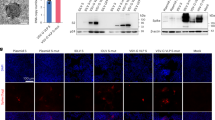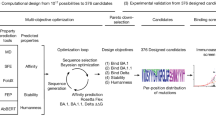Abstract
An E1a-deleted adenovirus vector constitutively expressing native adenovirus E3-gp19K (Ad.RSV-gp19K) was constructed in order to determine whether or not E3-gp19K mediated interference with antigen presentation would result in prolonged transgene expression in vivo. Cultured fibroblasts infected with Ad.RSV-gp19K produced a native size gp19K protein and had decreased cell surface levels of MHC I as shown by immunoprecipitation and flow cytometry. The congenic mouse strains Balb/b (H-2b MHC I with high gp19K affinity), Balb/k (H-2k MHC I with no gp19K affinity), and Balb/c (H-2d MHC I with moderate gp19K affinity) were chosen for in vivo experiments because of their range of gp19K affinities. Following transduction of mice from each strain with Ad.RSV-gp19K and Ad/RSV-hAAT (a reporter adenovirus), or Ad/RSV-cFIX (control adenovirus) and Ad/RSV-hAAT, the level and duration of serum hAAT protein were unrelated to gp19K protein expression. Evaluation of MHC I abundance on hepatocytes following in vivo transduction demonstrated that recombinant adenovirus rapidly increased the abundance of surface MHC I molecules on hepatocytes, and surface MHC I molecules were reduced earlier and to a greater extent following wild-type adenovirus infection compared with hepatocytes transduced with control or Ad.RSV-gp19K recombinant adenovirus. This difference in surface MHC I down-regulation may be related to the different promoters (RSV-LTR versus the native E3 promoter), and will be an important consideration in the development of newer generation adenovirus vectors designed to evade host immune responses.
This is a preview of subscription content, access via your institution
Access options
Subscribe to this journal
Receive 12 print issues and online access
$259.00 per year
only $21.58 per issue
Buy this article
- Purchase on Springer Link
- Instant access to full article PDF
Prices may be subject to local taxes which are calculated during checkout
Similar content being viewed by others
Author information
Authors and Affiliations
Rights and permissions
About this article
Cite this article
Schowalter, D., Tubb, J., Liu, M. et al. Heterologous expression of adenovirus E3-gp19K in an E1a-deleted adenovirus vector inhibits MHC I expression in vitro, but does not prolong transgene expression in vivo. Gene Ther 4, 351–360 (1997). https://doi.org/10.1038/sj.gt.3300398
Received:
Accepted:
Issue Date:
DOI: https://doi.org/10.1038/sj.gt.3300398
Keywords
This article is cited by
-
A trial of somatic gene targeting in vivo with an adenovirus vector
Genetic Vaccines and Therapy (2005)
-
E3 gene manipulations affect oncolytic adenovirus activity in immunocompetent tumor models
Nature Biotechnology (2003)
-
Persistent hepatic expression of human apo A-I after transfer with a helper-virus independent adenoviral vector
Gene Therapy (2002)
-
Production of first generation adenovirus vectors: a review
Gene Therapy (2000)
-
‘Autoreplication’ of the vector genome in recombinant adenoviral vectors with different E1 region deletions and transgenes
Gene Therapy (1999)



